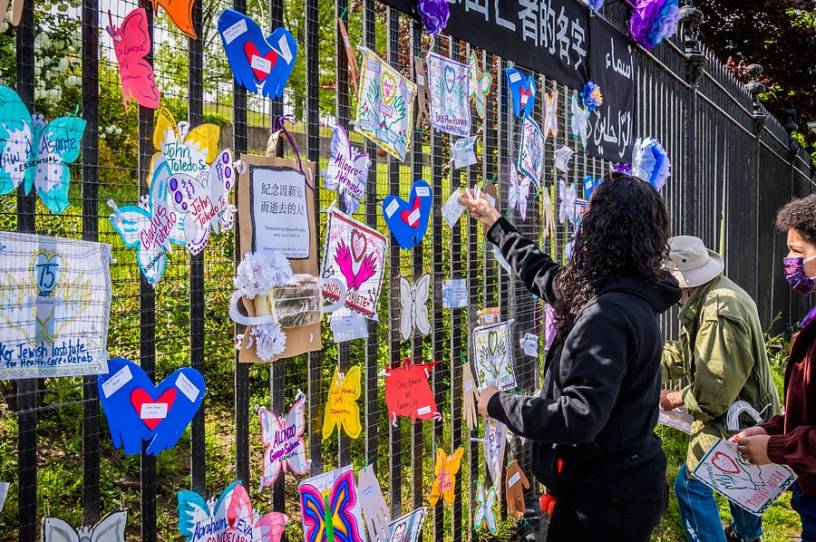A Day of Grief in a Season of Grief

I joined the military later in life. I was 37 years old when I went to my Officer Basic Course at Fort Lee, Virginia. I was 38 when I climbed into the back of a C-130 Hercules to fly into Iraq to begin my deployment with the Third Armored Cavalry Regiment at the height of the surge in 2007. I started that deployment with the conventional rhythms of civilian life thoroughly imprinted in my mind and heart.
Service in a war zone was a jolting experience in countless ways, but nothing prepared me for the shock of death. It’s not just the sheer extent of the casualties—one man, then another, then another, and three more—all cut down in the prime of life. It’s the unnatural inability to truly mourn their loss.
Back home, when a family member or friend dies—or even a friend of a friend—there’s a collective and often community-wide pause. Depending on your relationship to the deceased, you’re able to simply stop, to grieve or to share in the grief of others, to try to help bear another person’s burden. There’s a ritual that matters, and it’s a ritual that—ideally—helps a person begin to heal.
At war, however, there is the shock of loss and the immediate and overriding need to focus, to do your job. In fact, the shock of loss typically occurs exactly when the need to focus is at its greatest. At the point of the explosion—or the site of the ambush—there’s a fight for life itself. On the ground and in the air, there’s the symphony of rescue and response. In the relative safety of the TOC (tactical operations center), there’s an urgent need not just to understand but also to direct the fight.
And then, even when that fight’s over, no one stops. The only pause is for the “hero flight”—the helicopter mission that takes your fallen brother home. You stand, you salute in silence, and then you focus again.
Yes, there are short memorial services, often days later, but nothing about it feels right. Your soul screams for the need to grieve, but your mind answers: Grief is a distraction, and if you’re distracted then your mistakes can cause only more grief. So the cycle moves on, remorselessly. Death, shock, focus. Death, shock, focus.
It’s a cliché of course to say it, but I never appreciated Memorial Day until I had brothers to remember. I was home on a midtour leave on Memorial Day Weekend in 2008. We’d already taken too many casualties, and I’d had no time to grieve. I was still pushing the grief back. I still had to focus. I wanted to enjoy my time with my wife and kids, and to truly treasure that time, I had to hold back. They couldn’t see what I truly felt.
Then, the dam broke. My son was watching a NASCAR race and before the race started, they played Amazing Grace on the bagpipes, and I just lost it. I had to leave the room. It was too much. But that’s also when I saw the value of this day. It gives us back that pause that we lost. It gives us back that ritual we need. Memorial Day, properly understood, helps us heal.
As much as it’s a holiday reserved for remembering those lost in war, Memorial Day has lessons for the crisis of the moment. Memorial Day in 2020 is a day of grief happening in the midst of a season of grief. Today, in all likelihood, COVID-19 will claim its 100,000th American life. That’s 100,000 souls in roughly 10 short weeks. Even worse, for families and communities, there has been something deeply unnatural about the cycle of loss and mourning.
Sick family members have been whisked away, never to be seen again. Countless thousands have died alone, rather than surrounded by the people they love. Without true wakes, visitations, and funerals, communities have been unable to come together to lift each other’s burdens. There’s an old proverb (the internet says it’s of Swedish origin) that goes like this—“Shared joy is double joy. Shared sorrow is half-sorrow.” In our season of grief, all too many Americans haven’t been able to share their sorrow.
As the country slowly begins to confront the sheer enormity of its loss, we should learn from the power of Memorial Day. When we can gather again—when we can comfort our neighbors in person—remember not just who they lost but what they lost. They lost a ritual of grief that can never be restored. In the months and years to come, however, we can pause for them—we can pause with them—and give them the moments they need to help them heal.
Photograph of a memorial to coronavirus victims in Brooklyn by Erik McGregor/LightRocket/Getty Images.